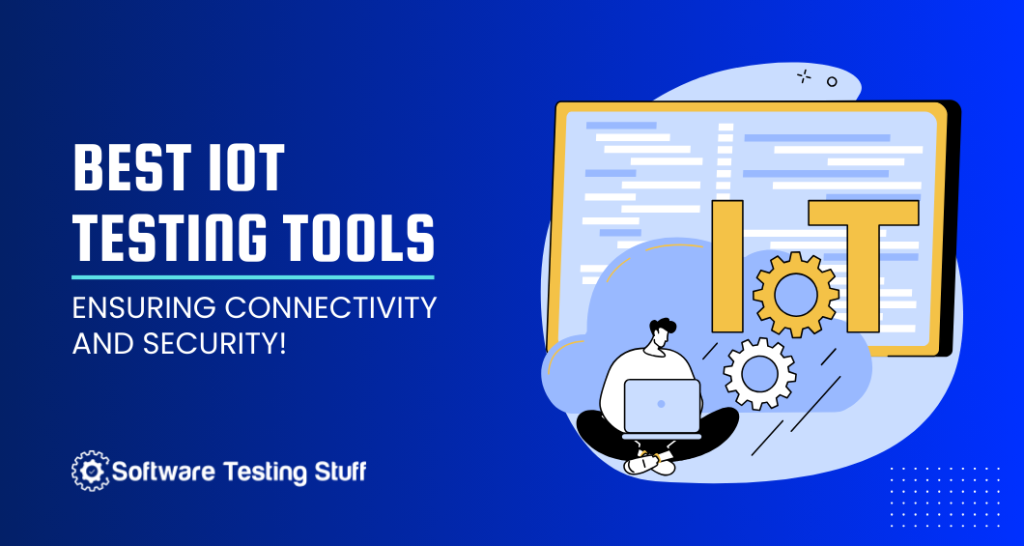In our world of connected devices, making sure everything works smoothly and stays secure is super important.
That’s where IoT testing comes in – it’s like a checkup for your smart gadgets, ensuring they’re reliable and efficient. As we use more smart devices, we really need these tests to find and fix problems, making our systems work even better.
There are various types of testing tools designed to navigate the intricacies of IoT ecosystems, each addressing specific aspects of functionality and security.
In this article, we’ll explore the diverse landscape of best IoT testing tools, shedding light on their unique capabilities. Whether it’s performance, security, or compatibility testing, our exploration will guide you through the essentials.
Get ready to dive into the realm of IoT testing, as we discover the best tools that promise to elevate your IoT experience.
Quick List Of Best 10 IoT Testing tools
Here is a brief overview of the top IoT Testing Tools:
- Jenkins: Best for continuous integration and automation of building, testing, and deploying software projects.
- Appium: Best for automated testing of mobile, web, and desktop applications, making it suitable for cross-platform IoT testing.
- MATLAB: Best for mathematical modeling, simulation, and algorithm development, often used in IoT projects for data analysis and signal processing.
- Shodan: Best for IoT security testing, providing a search engine to identify and assess devices connected to the internet, including vulnerabilities.
- Wireshark: Best for network protocol analysis, allowing users to capture and inspect data packets, crucial for diagnosing and troubleshooting IoT network issues.
- Postman: Best for testing APIs, making it essential for evaluating and validating the functionality of IoT APIs in various scenarios.
- Jama Connect: Best for requirements management and test management, ensuring traceability and collaboration in IoT projects.
- Apache JMeter: Best for performance testing, enabling the simulation of heavy loads and assessing the scalability of IoT applications.
- BlazeMeter: Best for cloud-based performance testing, allowing the simulation of large-scale IoT scenarios to evaluate application performance under different conditions.
- Robot Framework: Best for generic test automation, supporting web, desktop, and mobile applications and customizable for IoT testing requirements.
What Is IoT Testing?
IoT (Internet of Things) testing involves evaluating the functionality, performance, security, and interoperability of interconnected devices and systems in the IoT ecosystem. This specialized testing ensures seamless communication and proper functioning of diverse devices, such as sensors, actuators, and smart objects.
Test scenarios include data integrity, connectivity, firmware, and protocol assessments to validate device behavior under various conditions. Security testing is crucial to safeguard against vulnerabilities, while performance testing assesses responsiveness and scalability.
Interoperability tests verify compatibility among different devices and platforms. Given the dynamic and complex nature of IoT environments, comprehensive testing is vital to guarantee reliability, security, and optimal performance of interconnected devices in real-world scenarios.
What Should You Consider To Select The Best IoT Testing Tools?
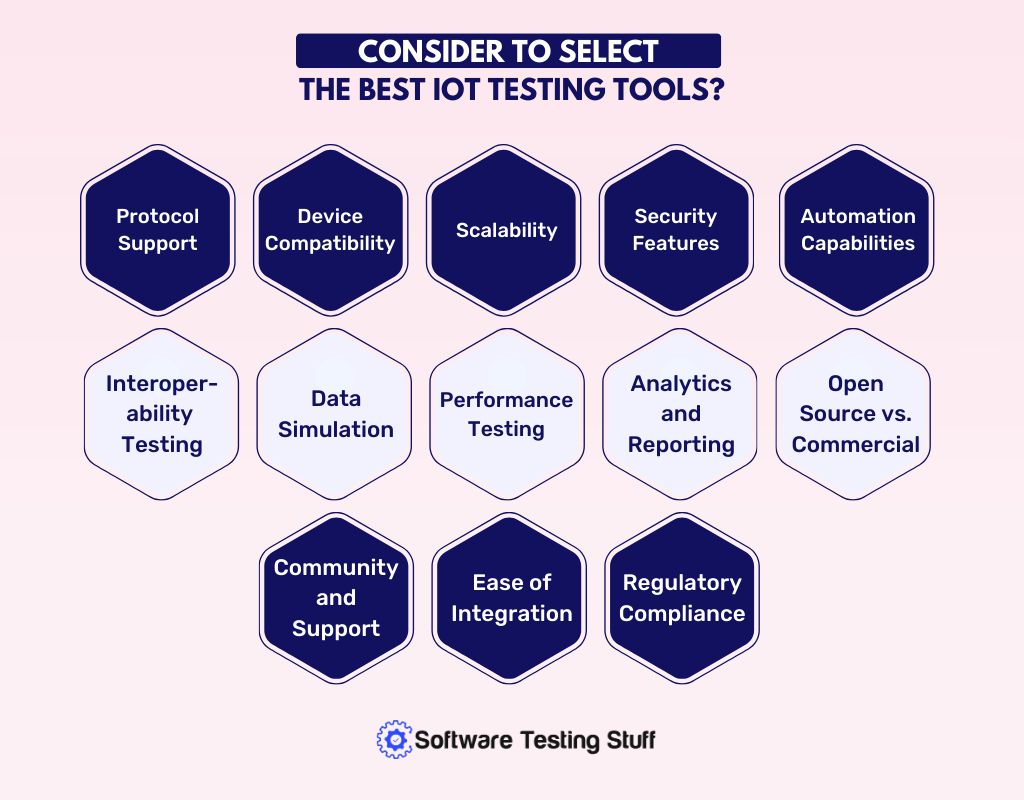
Selecting the best IoT testing tools requires careful consideration of various factors to ensure comprehensive testing and reliable performance in diverse IoT environments. Here are key aspects to consider:
Protocol Support
Ensure the tool supports common IoT protocols such as MQTT, CoAP, HTTP, and others relevant to your IoT ecosystem.
Device Compatibility
Check if the tool can test a wide range of devices, sensors, and platforms to ensure compatibility with your IoT devices.
Scalability
Evaluate the tool’s ability to scale with the growing number of IoT devices, ensuring it can handle large-scale deployments.
Security Features
Prioritize tools with strong security testing capabilities to identify vulnerabilities and ensure data integrity and privacy in IoT systems.
Automation Capabilities
Look for tools that offer automation features to streamline repetitive tasks, facilitate continuous testing, and support agile development processes.
Interoperability Testing
Ensure the tool can perform interoperability testing to validate seamless communication between different devices and platforms within your IoT ecosystem.
Data Simulation
Choose tools that can simulate diverse data scenarios, including edge cases, to mimic real-world conditions and assess how devices respond in various situations.
Performance Testing
Check for tools that provide performance testing capabilities to evaluate the responsiveness, latency, and scalability of IoT devices and systems.
Analytics and Reporting
Look for tools with strong analytics and reporting features to gain insights into test results, identify issues, and facilitate informed decision-making.
Open Source vs. Commercial
Consider whether an open-source or commercial tool better suits your needs, taking into account factors such as support, community involvement, and licensing costs.
Community and Support
Assess the tool’s user community and the availability of support resources, including documentation, forums, and customer support, to ensure assistance is available when needed.
Ease of Integration
Choose tools that seamlessly integrate with your existing development and testing environment, ensuring a smooth workflow without significant disruptions.
Regulatory Compliance
If your IoT project falls under specific regulations or standards, ensure that the testing tool complies with those requirements.
Top 10 IoT Testing Tools: Find The Best Ones!
Navigating the complex landscape of Internet of Things (IoT) testing is crucial for ensuring the reliability and security of interconnected devices. Explore the best 10 IoT testing tools that stand out in functionality, performance, and security assessments, paving the way for strong and seamless IoT applications.
1. Jenkins

Jenkins is an open-source automation server widely used for continuous integration (CI) and continuous delivery (CD) in software development.
Its primary purpose is to automate building, testing, and deploying code, ensuring efficient and reliable software delivery. Jenkins facilitates collaboration among development teams by automating repetitive tasks, reducing errors, and accelerating the development lifecycle.
Key features of Jenkins include its extensibility through plugins, enabling integration with a variety of tools and technologies. It supports the automation of building and testing processes, allowing developers to detect and fix issues early in the development pipeline.
Jenkins provides a user-friendly web-based interface and supports the creation of pipelines for complex workflows.
Best known for its versatility, Jenkins integrates with version control systems like Git, build tools such as Maven, testing frameworks, and deployment platforms, fostering a seamless and automated development environment.
Its strong capabilities make Jenkins a cornerstone in modern software development practices, enhancing efficiency and reliability in the CI/CD pipeline.
Pricing: Jenkins is a free IoT testing tool. However, additional costs may arise for enterprises that choose to implement Jenkins at scale and require additional features or support.
2. Appium
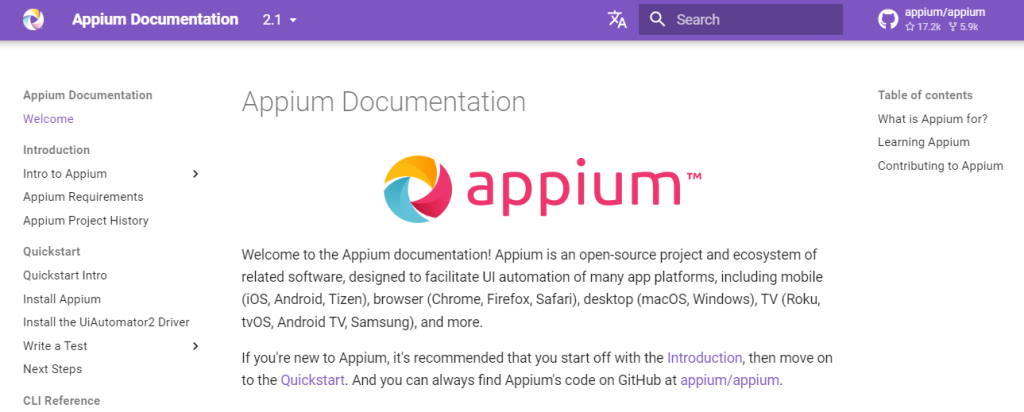
Appium is an open-source automation tool designed for testing mobile applications across different platforms, including iOS and Android. It simplifies the testing process by allowing developers to write tests using their preferred programming languages like Java, Python, or C#.
It is widely used for its cross-platform capabilities, making it efficient for testing applications on diverse devices. Key features of Appium include its support for native, hybrid, and mobile web applications, enabling comprehensive testing.
Appium provides seamless integration with popular development tools, ensuring a smooth testing workflow. Appium also supports real devices and emulators, allowing testers to simulate a range of environments.
One of its strengths is its ability to automate gestures, interactions, and other mobile-specific functions.
Appium’s versatility makes it best suited for organizations developing mobile applications, offering a reliable and unified testing framework that integrates with various programming languages and tools, facilitating efficient and effective mobile app testing across different platforms.
Price: Free
3. MATLAB

MATLAB, short for MATrix LABoratory, is a high-level programming language and interactive environment primarily used for numerical computing, data analysis, and algorithm development. It’s widely employed in engineering, science, and finance for its versatility and ease of use.
Key features include an extensive set of mathematical functions, built-in graphics for visualizing data, and a vast library of toolboxes for specialized applications. It excels in tasks such as signal processing, image analysis, machine learning, and simulations.
Best known for its matrix-based approach, MATLAB simplifies complex mathematical operations, making it ideal for solving intricate problems in diverse fields. It provides a collaborative environment with Simulink, allowing users to model, simulate, and implement multi domain systems.
Additionally, MATLAB integrates seamlessly with hardware, enabling users to deploy algorithms to embedded systems and integrate external devices for real-world applications. Its user-friendly interface and powerful capabilities make MATLAB a preferred choice for researchers, engineers, and scientists worldwide.
Pricing: $55-$3,850 per year
4. Shodan
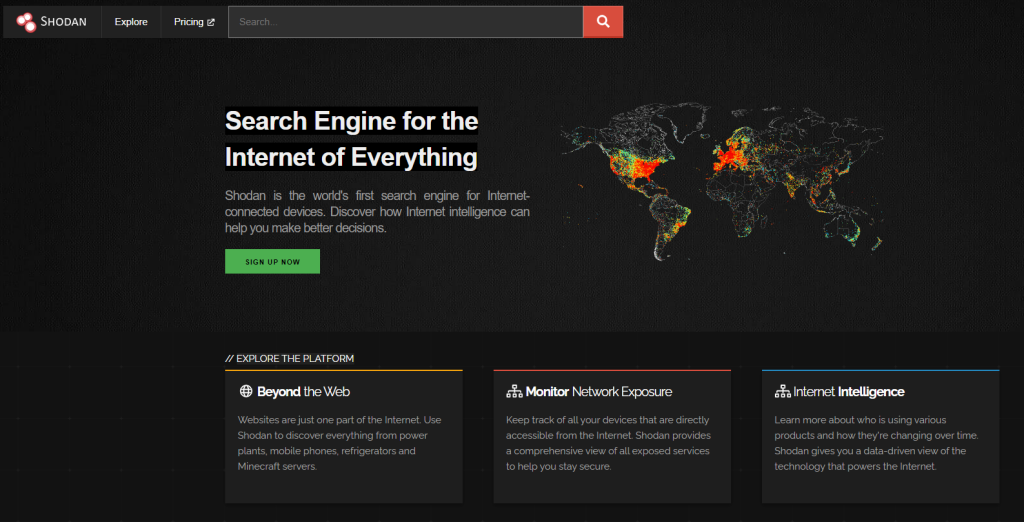
Shodan is a search engine designed for finding and analyzing internet-connected devices. Unlike traditional search engines that index websites, Shodan scans and indexes devices such as webcams, routers, and servers, providing information about their vulnerabilities and configurations.
It is commonly used for cybersecurity and network security purposes. Shodan’s features include the ability to search for specific devices, identify open ports, and gather information about the software running on those devices.
Shodan is best known for its utility in cybersecurity, allowing users to assess the security posture of devices connected to the internet. Shodan provides a platform to discover potential security weaknesses, making it valuable for both ethical hacking and identifying vulnerabilities before malicious actors do.
While Shodan itself does not integrate with specific tools, its data can be utilized by cybersecurity professionals, researchers, and organizations to enhance their understanding of the global internet infrastructure and to secure their own networks against potential threats.
Pricing: Starting price $49(one time) to $1,099/month and for Enterprises the pricing is customized.
5. Wireshark
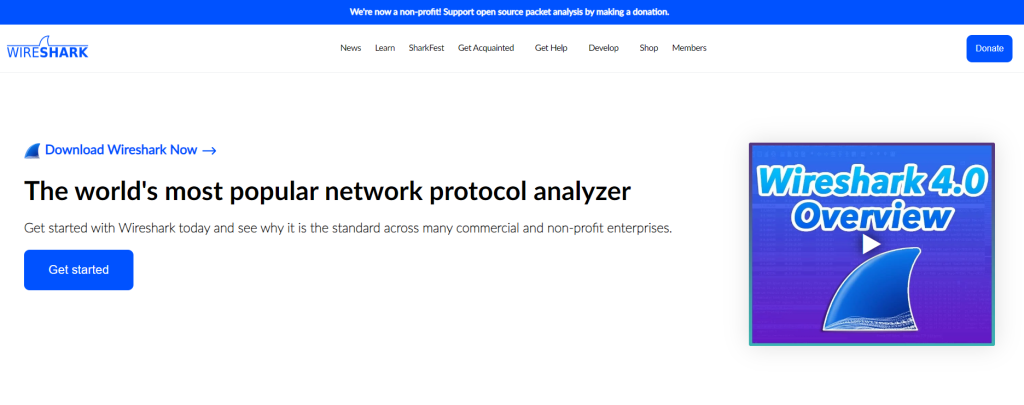
Wireshark is a widely-used network protocol analyzer that helps users inspect and understand the data traffic on a network. It is commonly employed for troubleshooting network issues, analyzing security threats, and optimizing performance.
With a user-friendly interface, Wireshark captures and displays the data packets traveling through a network in real-time. Its features include the ability to filter and analyze these packets, providing valuable insights into the network’s behavior.
Wireshark is best for diagnosing network problems, detecting security vulnerabilities, and ensuring proper communication between devices.
The tool supports various protocols and integrates with different operating systems, making it versatile for different network environments. Wireshark allows users to examine the details of each packet, identify the source of issues, and optimize network performance.
Whether for IT professionals, network administrators, or security analysts, Wireshark is an invaluable tool for gaining a deep understanding of network activity and ensuring the smooth operation of communication channels.
Pricing: Free
6. Postman
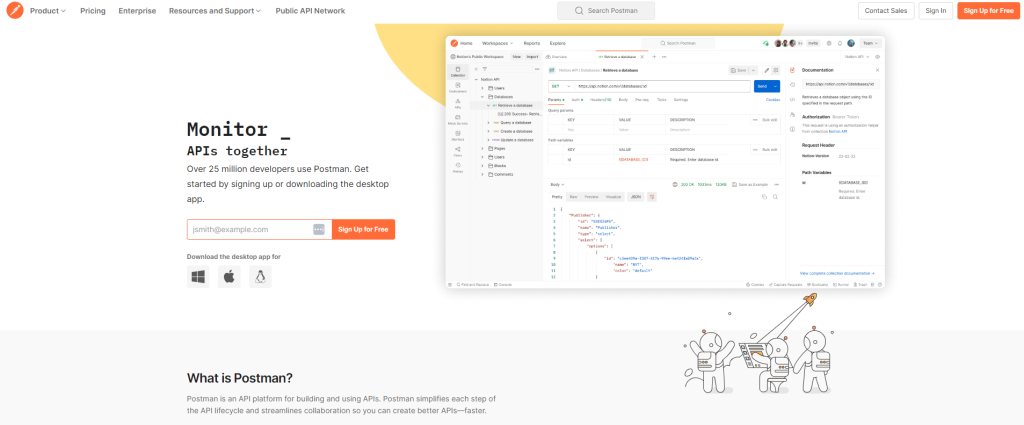
Postman is a popular API development and testing tool designed to simplify the process of working with APIs. It provides a user-friendly interface for creating, testing, and managing API requests.
Used by developers, testers, and DevOps professionals, Postman streamlines collaboration and ensures the seamless integration of APIs in applications. Its features include a strong request builder, automated testing workflows, and the ability to manage and monitor APIs.
Postman is best known for its versatility in testing RESTful APIs, allowing users to validate endpoints, check response times, and assess overall API functionality. It facilitates the creation of complex test scenarios, making it an essential tool for API quality assurance.
It provides a centralized platform for API development, testing, and monitoring, fostering collaboration among team members. It integrates with various platforms, including CI/CD tools, version control systems, and monitoring solutions, enhancing the efficiency of the API development lifecycle.
Overall, Postman simplifies API-related tasks, making it an indispensable tool for anyone involved in API development and testing.
Pricing: Starts at $14/month
7. Jama Connect

Jama Connect is a requirements management and test management platform designed to streamline and optimize the complex process of developing and testing products.
It serves as a centralized hub for managing project requirements, ensuring traceability, collaboration, and compliance throughout the development lifecycle.
Used across industries, Jama Connect enables teams to define, review, and validate requirements collaboratively, enhancing communication and reducing the risk of errors. Its features include real-time collaboration, customizable workflows, and comprehensive reporting tools.
Jama Connect is best suited for projects with intricate requirements, such as those in aerospace, medical devices, and automotive industries, where compliance and safety standards are critical. It provides a structured environment for capturing, organizing, and tracking requirements, facilitating efficient change management.
Furthermore, Jama Connect integrates with various development and testing tools, fostering a connected ecosystem. This integration capability enhances interoperability, allowing teams to seamlessly incorporate Jama Connect into their existing workflows, promoting efficiency and transparency in the product development process.
Pricing: No pricing found
8. Apache JMeter
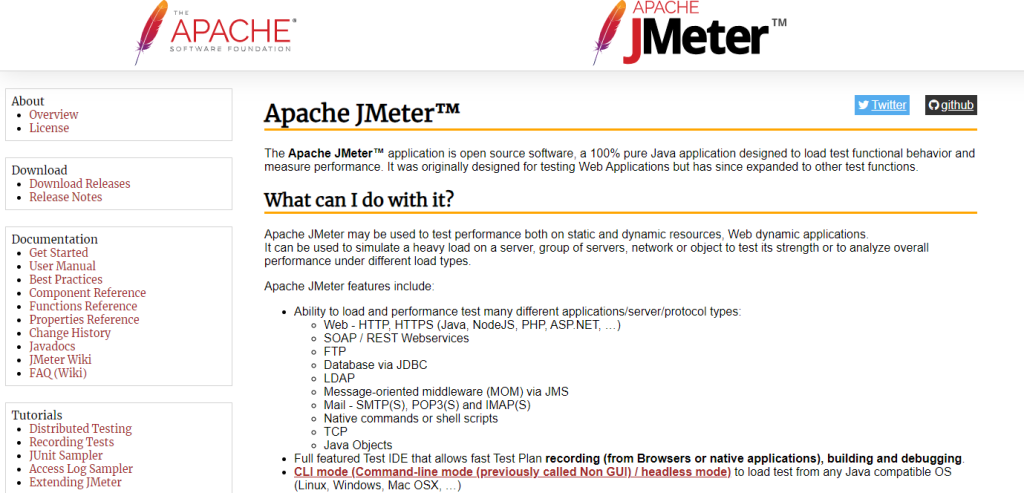
Apache JMeter is an open-source, Java-based performance testing tool designed to measure and analyze the performance of applications.
It is commonly used to simulate heavy loads and analyze the overall performance under various conditions, making it crucial for ensuring the scalability and reliability of web applications.
JMeter’s features include the ability to create and execute performance tests, measure response times, and analyze results through interactive visualizations and reports. It supports diverse protocols, including HTTP, HTTPS, FTP, and more, allowing for comprehensive testing of different application types.
Best suited for load testing and stress testing, JMeter helps identify bottlenecks, assess server performance, and analyze the behavior of applications under different user loads.
It provides a user-friendly interface for test creation and supports integration with various third-party plugins, enhancing its functionality. With JMeter, users can efficiently assess the performance of web servers, databases, and other services to ensure optimal functionality and user experience.
Pricing: Free
9. BlazeMeter

BlazeMeter is a cloud-based performance testing platform designed to assess the scalability and reliability of web and mobile applications.
It is used to simulate large-scale user scenarios, generating virtual traffic to evaluate how applications perform under various loads and conditions. BlazeMeter’s user-friendly interface facilitates the creation, execution, and analysis of performance tests.
Key features of BlazeMeter include the ability to simulate realistic user traffic, monitor application performance in real-time, and generate insightful reports. It is best suited for load testing, stress testing, and performance testing, helping identify performance bottlenecks and ensuring applications can handle high traffic volumes.
BlazeMeter provides integration capabilities with popular continuous integration tools, such as Jenkins, allowing seamless inclusion of performance testing in the development pipeline. It supports various protocols, including HTTP, HTTPS, and WebSocket, making it versatile for testing different types of applications.
Overall, BlazeMeter empowers developers and QA teams to optimize application performance and deliver a seamless user experience.
Pricing: Starter free, $99-$499 per month
10. Robot Framework
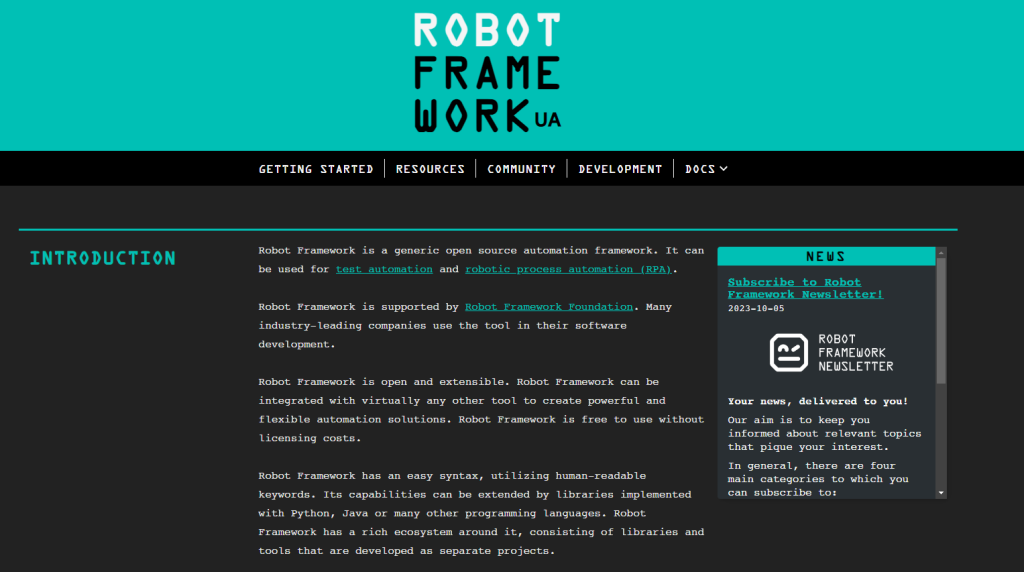
Robot Framework is an open-source, keyword-driven test automation framework designed for simplicity and versatility.
It’s widely used for acceptance testing, robotic process automation (RPA), and acceptance test-driven development (ATDD). The framework employs a plain-text, tabular syntax, making it accessible to individuals without extensive programming knowledge.
Key features include easy-to-read test cases, support for various test libraries and external plugins, and the ability to create modular and reusable automation scripts. Robot Framework is best suited for automating web, mobile, and desktop applications, offering flexibility for testing diverse technologies.
The framework provides clear and concise test reports and logs, aiding in efficient debugging and analysis of test results. It integrates seamlessly with Continuous Integration (CI) tools, version control systems, and various test libraries, enhancing its adaptability and usability across different development environments.
With its simplicity and extensibility, Robot Framework empowers testers and developers to create strong, maintainable, and scalable automation solutions.
Pricing: Free
Conclusion
Selecting the right IoT testing tools is crucial for ensuring the seamless functionality and security of interconnected devices. Each tool mentioned offers unique features and capabilities, catering to diverse testing needs.
Whether it’s the comprehensive testing provided by tools like Jenkins or the versatility of tools like Appium, the key lies in aligning the tool with specific project requirements.
Ultimately, a judicious choice of IoT testing tools not only streamlines the testing process but also enhances the overall reliability and performance of IoT ecosystems.
Frequently Asked Questions
Why is IoT testing important?
IoT testing ensures that devices work seamlessly together, identify vulnerabilities, and guarantee the reliability of data exchange in connected environments.
What challenges does IoT testing address?
IoT testing addresses challenges such as interoperability issues, security concerns, and the complex integration of diverse devices.
Can IoT testing tools ensure security?
Yes, many IoT testing tools include security testing features to identify and address vulnerabilities in connected devices.
Is compatibility testing important in IoT?
Yes, compatibility testing is crucial to ensure that IoT devices can communicate effectively and function as intended in various environments.
What role does IoT testing play in product development?
IoT testing is integral in product development to guarantee that devices meet quality standards, comply with regulations, and deliver a seamless user experience.
- 5 Best DevOps Platform and Their Detailed Guide For 2024 - December 26, 2025
- Top 10 Cross Browser Testing Tools: The Best Choices for 2024 - October 28, 2025
- 5 Best API Testing Tools: Your Ultimate Guide for 2024 - October 26, 2025
